Tipularia, Cranefly Orchid, Crippled Cranefly Orchid - Tipularia discolor
|
Tipularia discolor - Tipularia, Cranefly Orchid, Crippled Cranefly Orchid. There are 3 species of Tipularia, with only Tipularia discolor being found in the United States. The other two are Asian plants, 1 found in the Himalayas, and the other in Japan. Tipularia discolor is found in rich forests and oak-pine woods of the eastern part of the United States outside of New England, west to Illinois and south to Texas. It is protected as Threatened, Endangered, or Rare in Florida, Massachusetts, Michigan, New York, Pennsylvania, but can be quite common in parts of its range.
Found in:
AL, AR, DC, DE, FL, GA, IL, IN, KY, LA, MA, MD, MI, MO, MS, NC, NJ, NY, OH, OK, PA, SC, TN, TX, VA, WV
Leave comments on Tipularia discolor at this link. | 
Distribution of Tipularia discolor in the United States and Canada:
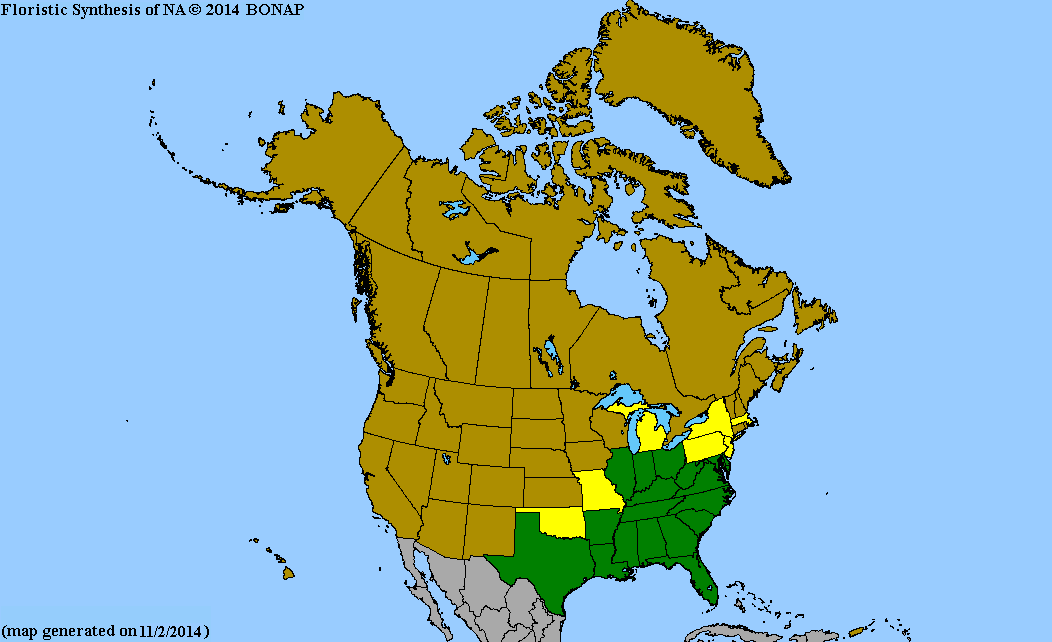
Map courtesy of The Biota of North America Program.
Map color key
Search Our Database: Enter any portion of the Scientific, Common Name, or both.
Do a general Google search of the entire site:
#ad
 Follow USWildflowers on Twitter
#ad
| | Site: Dade County, GA Date: 2013-August-05 | Photographer: Gerald C. Williamson
Nikon D7000
Tamron SP 90MM f/2.8 AF Macro | | The flowering stem grows to 18 to 20 inches tall. It is scape-like, glabrous, and leafless. | | 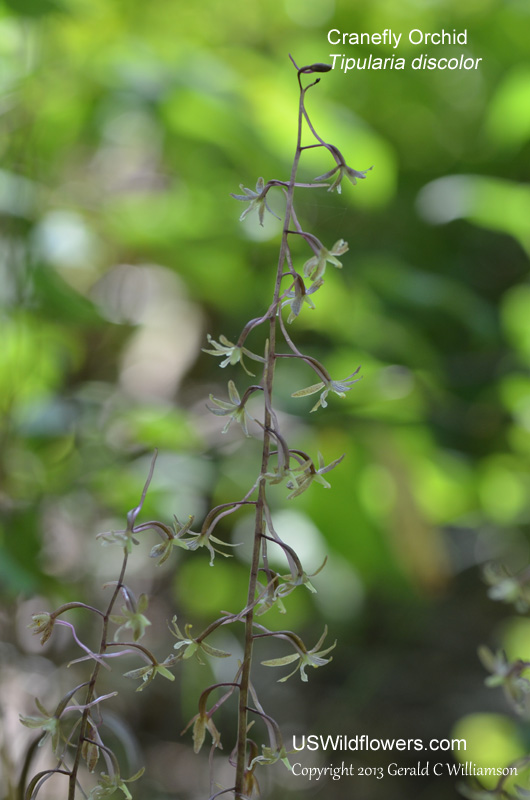
| | Site: Flintstone, Walker County, GA Date: 2013-September-03 | Photographer: Gerald C Williamson
Nikon D7000
Tamron SP 90MM f/2.8 AF Macro
90 | | There is a solitary stem per plant that appears in summer - June through September, depending on the region. Strangely, the plant blooms earlier in the northern part of its range than in the southern. The scape is terminated by a raceme of up to 55 small green, greenish yellow, or greenish purple blossoms. The blossoms apparently appear like a group of crane flies hovering around the stem - the genus name Tipularia comes from the name of the Crane Fly insect genus Tipula. | | Click on the photo for a larger image
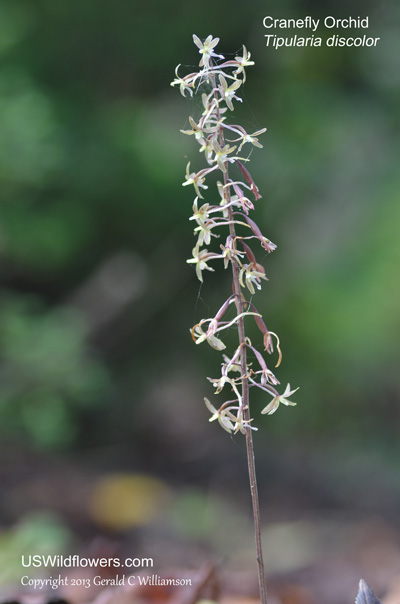
| | Site: Flintstone, Walker County, GA Date: 2013-September-03 | Photographer: Gerald C Williamson
Nikon D7000 | | The flowers of Cranefly Orchid are green, pale greenish yellow, or greenish purple. There is a long spur off the base of the petals that may be up to nearly an inch long. | | Click on the photo for a larger image
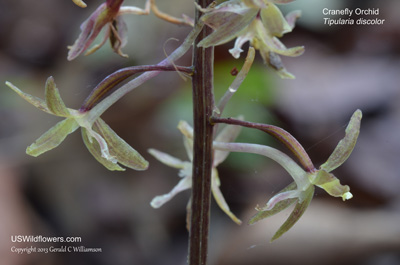
| | Site: Long Branch Preserve, Walker County, GA Date: 2013-August-07 | Photographer: Gerald C Williamson
Nikon D7000 | | The flower of Cranefly Orchid are green, pale greenish yellow, or greenish purple. There is a long spur off the base of the petals that may be up to nearly an inch long. | | Click on the photo for a larger image
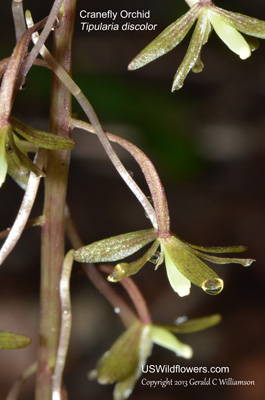
| | Site: Long Branch Preserve, Walker County, GA Date: 2013-August-07 | Photographer: Gerald C Williamson
Nikon D7000
Tamron SP 90MM f/2.8 AF Macro | | | | Click on the photo for a larger image
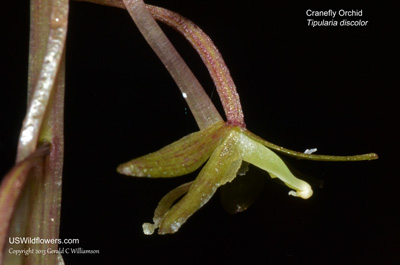
| | Site: Long Branch Preserve, Walker County, GA Date: 2013-August-07 | Photographer: Gerald C Williamson
Nikon D7000 | | The blossoms open at the bottom of the racemose inflorescence first. | | Click on the photo for a larger image
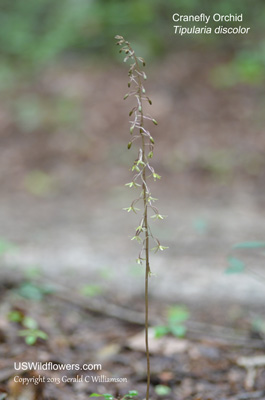
| | Site: Virgin Falls State Natural Area, White County, TN Date: 2013-March-09 | Photographer: Gerald C Williamson
Nikon D7000 | | The seed capsules each contains many tiny seeds. Since the leaf appears after the blooming period, the leaf and scape with seed capsules frequently coincide. | | Click on the photo for a larger image

| | Site: Long Branch Preserve, Walker County, GA Date: 2012-December-15 | Photographer: Gerald C Williamson
Nikon D7000 | | The leaf of Tipularia discolor is green or green with purple tints on top, and purple underneath. The leaf emerges from the spongy corm in the autumn after the plant has bloomed, and persists through the winter. It will wither and be gone by the time the new year’s floral scape appears. There is a single leaf per plant, and due to that single leaf some authorities formerly classified the plant as Tipularia unifolia, a name that is no longer accepted as correct. | | Click on the photo for a larger image
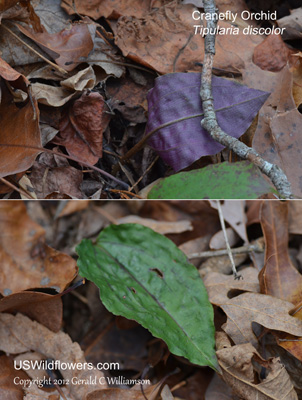
|
References used for identification and information:
|
|
| |
| #ad
|
|










